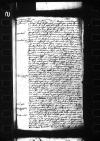Pro veteri illa nostra in aula ⌊sacratissimae caesareae maiestatis⌋ coniunctione et ea benevolentia, qua me semper humanissime prosequebatur Magnificentia Vestra, in ea persevero fiducia, quod illam animi sui in me propensionem et candorem neque temporis diuturnitas aut tanta locorum intercapedo diminuere, vel in conservandis amicitiis Magnificentiae Vestrae constantia immutare quicquam potuerit. Qua in re factus audentior, ⌊hunc cubicularium⌋ cum ⌊serenissimi regis mei⌋ litteris et negotiis Magnificentiae Vestrae commendandum operae pretium esse censui, utpote et quae magnae apud ⌊caesaream maiestatem⌋ auctoritatis est, et quae suapte natura ad provehendum res iustas reiquae Christianae apprime necessarias facile inclinatur. Non est Magnificentiae Vestrae incognitum, quibus modis ⌊iudicium camerae imperialis⌋ contra nepotem ex ⌊sorore⌋ ⌊serenissimi regis mei⌋ et subiectum regni eius principem, illustrissimum dominum ⌊Albertum marchionem Brandenburgensem et ducem in Prussia⌋, bannum emiserit, quod ⌊serenissima caesarea maiestas⌋, cum ⌊Ratisponae⌋ essemus, ad decursum duorum annorum suspendit, unde cum hoc tempus brevi iam exspirare videtur, ne inde graviores turbae aut fortassis apertum et ⌊reipublicae Christianae⌋, quae iam tumultibus plena est ubique , perniciosum bellum accenderetur, ⌊serenissimus rex meus⌋ pro senili et vere regia sua prudentia ⌊serenissimae caesareae maiestati⌋ cum hoc cubiculario scribendum duxit, quarum litterarum ut Magnificentia Vestra benigna velit esse interpres habita istius adeo periculosi temporis ratione, summopere rogo, quo vel iterum negotium hoc exsecutionis banni quam diutissime suspenderetur, vel e medio, si fieri posset, cum ⌊camerae imperiali⌋ nihil in ⌊subditos⌋ ⌊serenissimi regis mei⌋ iuris competit, penitus tolleretur.
Quod nisi obtineatur, fieri non potest, quin etiam hic in nostro angulo omnia, quemadmodum fere iam per totum ⌊Christianum orbem⌋ in turbas et gravissimam tragoediam exundent et non sine magna aeris et (quod omen procul absit) sanguinis Christiani profusione transigantur. Quod ut Magnificentia Vestra pro sua auctoritate et in rebus summa perspicientia, quantum potest, avertat, oro atque obtestor, a Deo Omnipotenti aeternum praemium et ab hominibus meritam gratitudinem et laudem habitura amplissimam meque , qui pro officio ordinis mei ecclesiastici pro conservanda tranquillitate publica nihil aliud quam pacem a Deo peto, reddet sibi Magnificentia Vestra devinctissimum. Cuius me benevolentiae ex animo commendo Deumque precor, ut Magnificentiam Vestram quam diutissime sospitet et prosperet in omnibus. ⌊Petrum olim dispensatorem meum⌋, qui mihi fidelissime inservivit, ut gratia sua Magnificentia Vestra prosequatur, plurimum rogo. Virtus et fides eius digna est, ut a Magnificentia Vestra commendata habeatur.
